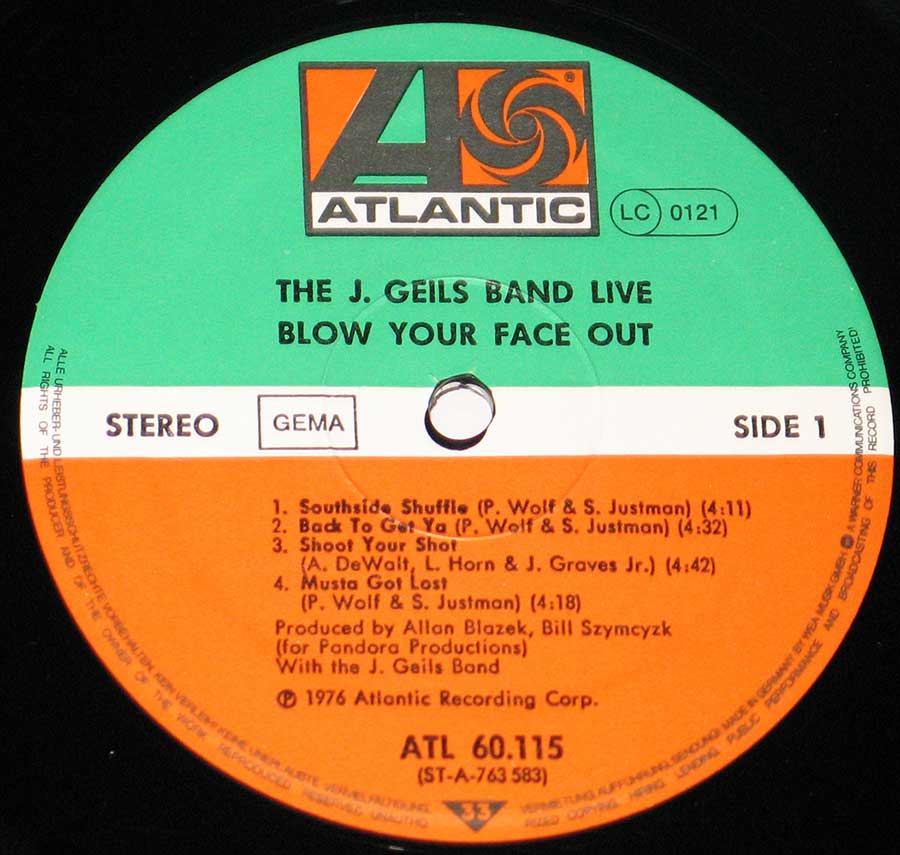
"As soon as I saw Jerry Lee Lewis kicking over that piano stool and standing on his piano, and saw Chuck Berry duck-walking across the stage and Little Richard and Frankie Lymon popping out from behind the Teenagers and singing 'Why Do Fools Fall in Love?' I was enraptured," Wolf said last week in a phone interview.

#J.geils band whammer jammer lyrics tv#
Wolf has enjoyed plenty of amazing experiences, starting at age 10, when his big sister - a dancer on deejay Alan Freed's TV show - dragged him to a concert that included Chuck Berry, Jerry Lee Lewis, Little Richard, Frankie Lymon and the Teenagers, the Chantels and Buddy Holly. The group has since reformed to play the occasional one-off show, but they show no signs of reforming fulltime."It feels good to get back together with a group where you've had older experiences with a lot of stuff you've helped create that still remains meaningful to people today," Wolf said. The released the 1984 flop, You're Gettin' Even While I'm Getting' Odd, with Justman on vocals and called it a day shortly thereafter. From there, the band began to fall apart. Only two years after their monster hit, Wolf left the group, citing creative differences. Though the album was much more radio-friendly and polished than their early work, it retains a touch of the bluesy style of their past, especially in Geils' guitar work.

Freeze Frame hit #1 mostly on the strength of the massive single "Centerfold." The single shot up the charts, hitting the top of the Billboard Hot 100. Over the next nine years, they put out more than seven studio albums, two live albums, and a "Best of" disc, but none of them made the commercial dent that their 1981 album Freeze Frame did. Their next album, 1971's The Morning After, shared a similar covers-to-originals ratio to its predecessor, but it was a bigger hit, charting at #64. About half of the disc's 11 songs are covers of songs made popular by famous blues singers, like John Lee Hooker's "Serves You Right to Suffer" and "First I Look At the Purse" - a song co-written by Smokey Robinson and Bobby Rogers (member of the Miracles), that was made famous by the Contours. However, it charted in the Billboard Top 200 (#195), and gave the band a base to start touring. The group released its self-titled debut on November 16, 1970, and it wasn't much of a commercial success. By 1970, the group had signed with Atlantic Records, picked up Seth Justman on organ, and dropped "Blues" from their name. In 1967, the group recruited Peter Wolf to sing and Stephen Jo Bladd on drums under the moniker the J. In the mid-'60s, Worcester, Massachusetts blues guitarist John Geils formed a blues group called Snoopy and the Sopwith Camels with Danny Klein on bass and Richard "Magic Dick" Salwitz on harmonica. Geils band was best known for their '80s pop hit "Centerfold," they formed 15 years before the release of said song. It is a fantastic, rollicking way to end an exuberant effort from a band in its prime. The rhythm section is also rock solid, as drummer Stephen Bladd and bassist Danny Klein never fall behind the frenetic pace. The song features a spellbinding lick-for-lick sequence with Geils, keyboardist Seth Justman, and harmonica player Magic Dick. Their final song is the drum-driven "Lookin' For Love," a song written by famous R&B man James "J.W." Anderson. Fitting in beside "Give It To Me" is their fourth song, John Lee Hooker's "Serves You Right To Suffer." The bands 14-minute version is highlighted by vocalist Peter Wolf's commanding performance as he raps Hooker's lyrics with total commitment.

Guitarist and founder John Geils takes over the 11-plus minute centerpiece with some impressive pentatonic lead guitar work. For the first time, the group open things up and embark on an extended jam. Though the first two songs combine to be about six minutes long, the group's third song (and first original) "Give It To Me," the epic final track from Bloodshot, goes a little longer. They head straight into a cover of Juke Joint Jimmy's "Whammer Jammer." The group was known for covering blues staples, especially those of Juke Joint Jimmy's, and they cover three of his songs on their first two albums. "(Ain't Nothin' But A) House Party" is an upbeat, bluesy rocker, that is a sign of things to come.

The band is in fine form, opening up with the leadoff track from the aforementioned Bloodshot. The show took place less than a month after the quintet released their third studio album, Bloodshot, a record that reached #10 on the Billboard Pop Album charts. Geils Band was captured at the Academy of Music in New York City in May of 1973 for the King Biscuit Flower Hour. John Geils - guitars Stephen Bladd - percussion, drums Seth Justman - keyboard, vocals Danny Klein - bass Magic Dick - harmonica Peter Wolf - vocals


 0 kommentar(er)
0 kommentar(er)
